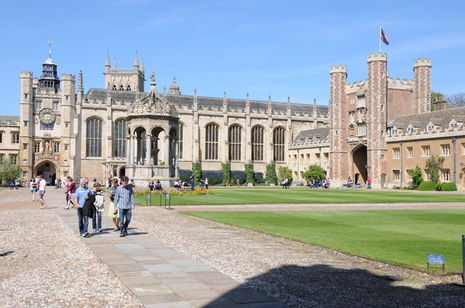Trinity’s academic outreach scheme is an example to follow and to further
Linus Uhlig welcomes Trinity’s outreach scheme, and reflects on his own experiences, arguing that all colleges must do more to help prospective applicants overcome their biases.

“I don’t think that’s for me, Miss.” “I’m not sure if I belong there, Sir.” These were common responses to suggestions of applying to Oxbridge at my rural comprehensive school. Frankly, the mere mention of the words 'Oxford' or 'Cambridge' were often met with scepticism, seen as an unachievable academic milieu where people in tweed suits cycle between libraries and swan about in halls drinking port, their conversation leaping from classical music to theories about ancient civilisations and philosophical concepts. In other words, as a peer at school put it, these universities are “places for Prime Ministers and poshos, not for people like us.”
As someone who is neither of these and fortunately has not felt out of place at Cambridge – although I acknowledge that some students do – I know this assumption could not be further from the truth, yet I understand and sympathise entirely with why it was uttered.
This week, Trinity College announced the launch of a scheme by its outreach team to support Year 12 students from low-income and disadvantaged backgrounds by providing student mentors to assist with academic confidence and gaps in knowledge caused by the pandemic. In an article published on Trinity’s website, the Outreach Coordinator who devised the programme, Jon Datta, said, “We expect the scheme to break down barriers, both real and perceived, to selective universities.” This announcement has been widely welcomed and is undoubtedly a step in the right direction. As someone who attended a Year 12 Humanities Residential at Trinity with a fair degree of scepticism and nervousness, I am aware of just how useful these schemes can be.
"This announcement... is undoubtedly a step in the right direction."
Many GCSE and A level students who attend such residentials or take part in outreach schemes find them incredibly fulfilling. I heard other students at school who visited Downing claim that it was one of the first times they felt that they were in a room full of like-minded people. Outreach schemes and residential trips provide students with the confidence and the impetus to consider an application to one of the world’s most prestigious universities, and open many young people’s eyes to the wide-ranging opportunities that come with attending. They really are that valuable.
Therefore, all colleges must do more to attract a broader range of applicants. Access schemes, summer schools, and headline-grabbing announcements of an increasingly broad demographic are unquestionably positive moves, but the real work is done on the ground and in schools.
When I arrived at Cambridge, I was surprised to hear that so many schools across the country had assemblies on applying to Oxbridge, and it was not until joining the sixth form college in my nearest city that I experienced anyone from Oxford or Cambridge come in to talk about applying. I asked many of my school friends if they knew which was our designated regional outreach Oxbridge college. The answer: a resounding no. Whilst anecdotal, I don’t think this would be an uncommon theme in comprehensives across the nation. Oxford and Cambridge do not exactly struggle when it comes to funding for projects, so why not invest more time and resources into schemes that make all students feel wanted, and Oxbridge seem a realistic and achievable destination?
Of course, this is not something that can be changed overnight, or even from one year of applications to another. A recent report showed that a majority of schools that educate the 20% most privileged students in the country have at least one “university adviser” always on hand to provide support for applying to the most prestigious universities. It is therefore unsurprising that a small group of schools continue to dominate Oxbridge admissions and, whilst the percentage of state school students continues to rise each year, there is still a proportional imbalance.
These pre-university disparities are difficult to alleviate. What is needed, therefore, is a broad demographic to take up places thanks to wide outreach across the UK, with the use of greater presence in schools and access weekends in under-represented areas, to connect with more students and give them the confidence to apply.
"Colleges must be proactive and use their resources to reach out to everyone."
Oxbridge becomes a less daunting and more accessible place if someone you know has been or currently attends, and this is the long-term impact of outreach schemes. In fact, shocked by the lack of red chinos and suede shoulder-padded jackets, school friends remarked on just how surprisingly normal everyone was when they visited, and are now more receptive to the idea of Oxbridge.
Trinity’s mentoring is unquestionably a scheme that should be replicated, an example to follow. Yet we might not reap the rewards of greater access for years. So, until we do, colleges must be proactive and use their resources to reach out to everyone in order to eradicate the aforementioned retort of, “I don’t think that’s for me, Miss.”
 Interviews / Lord Leggatt on becoming a Supreme Court Justice21 January 2026
Interviews / Lord Leggatt on becoming a Supreme Court Justice21 January 2026 Features / Are you more yourself at Cambridge or away from it? 27 January 2026
Features / Are you more yourself at Cambridge or away from it? 27 January 2026 News / Reform candidate retracts claim of being Cambridge alum 26 January 2026
News / Reform candidate retracts claim of being Cambridge alum 26 January 2026 News / Stand Up To Racism protests in solidarity with Minneapolis marches28 January 2026
News / Stand Up To Racism protests in solidarity with Minneapolis marches28 January 2026 News / Vigil held for tenth anniversary of PhD student’s death28 January 2026
News / Vigil held for tenth anniversary of PhD student’s death28 January 2026











